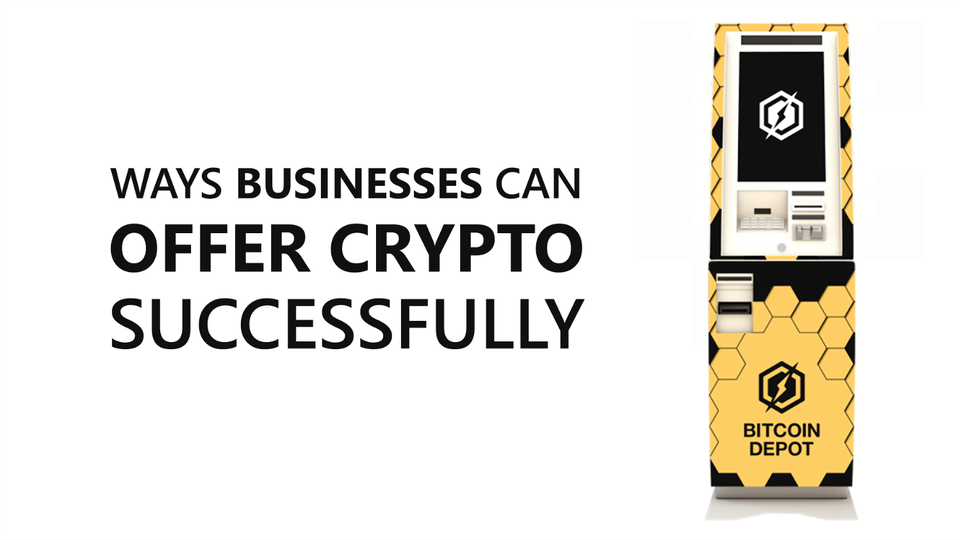Commentary
4 ways businesses can offer crypto ATMs successfully
Current ATM operators can add or transition to crypto ATMs successfully when they understand the process, pick the right location and choose a reliable partner.

November 15, 2021 by Brandon Mintz
The dramatic fluctuations in cryptocurrencies in 2021 has prompted a broader acceptance and interest in the financial technology industry and led to the increased demand for access to the main cryptocurrencies including bitcoin, Ethereum, Litecoin and others.
One of the routes for people to purchase cryptocurrencies safely and quickly is through the use of crypto ATMs, which are machines that function similarly to traditional ATMs. There has been tremendous growth in this sector and the crypto ATM industry continues to excel at a rapid pace.
With crypto's wider adoption and interest among consumers, retailers everywhere, like Circle K and most recently Walmart, are warming up to bitcoin, evaluating their current financial service offerings and looking for exciting new technology to drive additional traffic to their stores.
But how do you know if you're ready to add crypto as an offering and host a bitcoin ATM? Businesses should run through the following checklist to build a knowledge base about cryptocurrency's advantages and prepare for the next generation of ATM technology to improve the customer experience.
1. Pick the right location(s)
Cryptocurrency ATM operators can follow some of the same strategies as traditional ATM machine providers. For example, the machines rely on foot traffic and extended operating hours, which includes locations like 24-hour gas stations and convenience stores. These stores offer accessibility as well as opportunities for planned and spontaneous purchasing.
Operators should understand the physical space required for a crypto ATM and ensure that the logistics are right for a given location. For store operators, the machines increase foot traffic and offer commissions which could generate up to thousands of dollars a month.
Cryptocurrency ATM hosts also need to ensure that their machines are findable via searches. This includes Google Maps searches as well as on various sites that post the location of the customer's closest cryptocurrency ATM.
2. Be mindful of regulations and security
Despite sharing the same acronym, traditional ATMs aren't interchangeable with cryptocurrency ATMs. Retailers will need to purchase a new type of machine that's able to buy and sell cryptocurrencies and provide users with fiat currency such as U.S. dollars. These machines are secure and follow many of the same protocols as traditional ATMs. Operators should learn as much as they can about the security of their machines so they can reassure potential customers.
There are multiple state-by-state regulations governing cryptocurrency transactions and ATMs. Operators are encouraged to understand these regulations and lean on the expertise of a multi-state provider that understands and follows those regulations.
3. Learn about crypto and be an advocate
Operators of crypto ATMs such as gas station or convenience store owners will encounter some questions from customers about their new machine. While they may not be able to answer all questions and might need to refer to the crypto ATM provider, retailers should consider learning as much as they can about cryptocurrencies and the machine's operation. Bitcoin ATMs require users to have a preferred cryptocurrency wallet they'll need to receive purchased bitcoins and other cryptos.
Some providers offer their own wallets; however, any confirmed crypto wallet address will work fine. The buyer will confirm the amount of the purchase (e.g., $500 of bitcoin), scan the wallet QR code when prompted, and then insert cash to complete the transaction and receive the crypto. It's a simple and reliable process that's accessible to customers with limited technical knowledge.
Operators can learn about wallets and the cryptocurrencies available for purchase so they have more context about customer questions and can add value to their bitcoin ATM commissions. They can build a reputation for service and knowledge that produces word-of-mouth referrals for other cryptocurrency buyers.
4. Team with a strategic and credible partner
A top-tier cryptocurrency ATM provider offers multiple services that ensure store operators receive steady returns with minimal time expended. Look for a vendor who offers full maintenance and support services to ensure maximum uptime and protect the store's brand reputation.
For example, when multiple customers leave poor reviews for a liquor store because of an inoperable cryptocurrency ATM, this will negatively impact non-crypto purchasing within the store.
Experienced vendors will also partner with armored truck firms who manage the cash handling logistics. And when it comes to commission payments, some vendors may even offer flexible options for payment.
Current ATM operators can add or transition to crypto ATMs successfully when they understand the process, pick the right location and choose a reliable partner that gives them steady commissions and more paying customers.
About Brandon Mintz
Brandon Mintz is the founder, president and CEO of Bitcoin Depot, a leading BTM operator with the largest network of BTMs deployed in North America. Fostering an entrepreneurial mindset from a young age, Mintz was an early adopter of cryptocurrency and is a vocal advocate for simplifying its access for everyone. While attending the University of Georgia, he started his first cryptocurrency company, and in 2016, he established Bitcoin Depot with a mission to bring cryptocurrency to the masses by providing the most secure, convenient and speedy process to convert cash into cryptocurrency.
 ChatGPT
ChatGPT Grok
Grok Perplexity
Perplexity Claude
Claude









